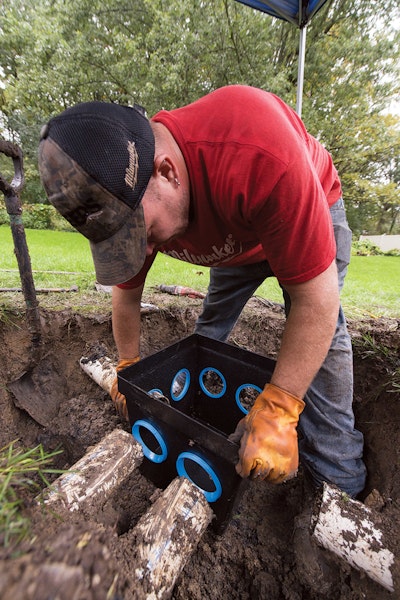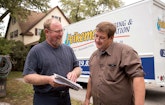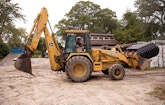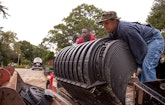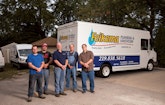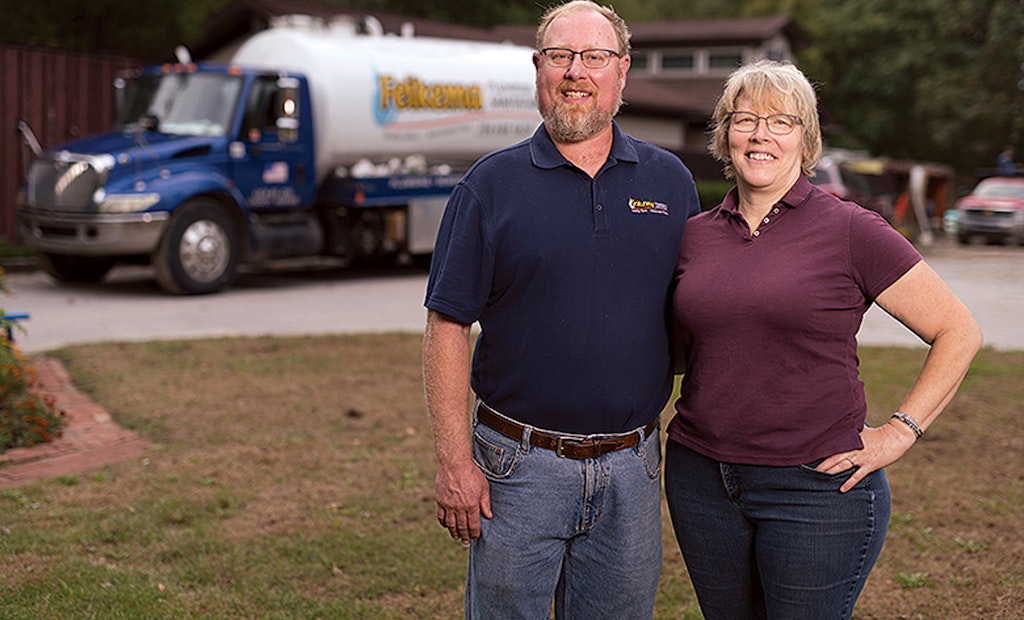
Dirk and Jill Feikema are shown with their vacuum truck, built out by Advance Pump & Equipment and carrying a pump from National Vacuum Equipment.
A few years after Dirk Feikema bought Wesley Feikema & Son Sanitation Services from his father in 2006, he changed the name to Feikema Plumbing & Sanitation — a move that reflected the company’s growing shift toward a more diverse business base.
“So many of our septic customers said they didn’t know I also did plumbing, so I had to do something about that,” says Feikema, 50, the third-generation owner of the company. His grandfather, the late Peter Feikema, established the business in 1956 in Munster, located near the Illinois/Indiana state line in the northwestern corner of Indiana.
Why Feikema changed the face of his business offers a valuable lesson for pumpers about recognizing new market niches — and investing in the technology required to capitalize on those markets. And for pumpers looking to add a new revenue stream, Feikema’s success underscores how plumbing and drain cleaning offer a complementary, hand-in-glove fit.
“There was never any kind of master plan,” the master plumber says, explaining the company’s gradual makeover. “It was just a go-where-God-leads-you kind of thing. I’m good at what I do, but I’m no strategic genius. Plumbing was just more my thing, while my father (Wesley Feikema, now retired) just loved to dig holes.
“I started out by just filling customers’ needs,” he adds. “Eventually it grew from a part-time thing into basically three of us now doing service (plumbing) work and one guy doing septic tanks full time.”
CHANGE WITH THE TIMES
Market forces nudged Feikema toward plumbing, but it didn’t happen overnight. As new-home construction slowed in the northern half of Lake County where the company does most of its work, demand for excavation work declined. Meanwhile, demand for service plumbing grew as the housing stock aged. As such, local plumbing work just made more sense than incurring higher travel expenses and wear and tear on vehicles to reach the farther construction work, he says.
“We could follow the new-construction world, but that would mean working farther and farther away from our yard,” he says. “Or we can focus on fixing our neighbors’ problems and stay 5 to 10 miles away from our yard. It’s a no-brainer.”
But it wasn’t always that way. The company started out as Peter Feikema Excavation and primarily focused on new residential construction work, fueled by the post-World War II building boom that drove demand for everything from basements to septic system installations. After a few years, Peter Feikema and his son, Wesley Feikema, decided to do pumping work, as well as septic system installations. Along with that, the company branched out into installing waterlines, sewer lines and drain tiles.
Dirk Feikema started working for his father during summers after he graduated from eighth grade. He went to college with ambitions to be a teacher. But after he graduated from college in 1991 with a history degree from Calvin College in Michigan, he decided to work for his father.
At the time, the company was dabbling in minor plumbing jobs, but Feikema felt it could be more valuable than just fill-in work. “So drain cleaning and service plumbing became my thing,” says Feikema, who started attending plumbing school. “I’d pump two septic tanks in the morning and then do two or three drain cleanings in the afternoon. That’s how we went along for years.”
SOLVING PROBLEMS
The bulk of housing in the company’s service area was built in the 1950s, ’60s and ’70s, and the company has been around long enough now that some clients have been customers for decades.
“I’ve pumped the same septic tanks that my grandfather and father pumped and worked on sewer lines that my grandfather and father installed in the 1970s when a lot of people were converting from septic systems to sewers,” Feikema says. “I take a lot of pride in that,” he continues. “To me, our long-time customers are extended family. I don’t even need their home addresses. … They’re one of the reasons I came back home to do this (after college). It’s very gratifying.”
To serve septic customers, the company relies on a 2002 International 4400 built out by Advance Pump & Equipment with a 3,500-gallon aluminum tank and a Challenger 360 vacuum pump made by National Vacuum Equipment. The truck carries a ROTHENBERGER USA R600 drain cleaning machine.
The company also owns a soil-restoration machine made by the Terralift International Family of Cos. and uses soil-remediation kits made by Ecological Laboratories; Lenzyme Trap-Cleer bacteria additives; TUF-TITE EF-6 combo filters; and hoses made by Kanaflex. “It’s a smooth-exterior hose, which is easier to drag — less likely to get caught on a corner while going through garages and breezeways, which we often have to do,” Feikema says.
Feikema fashions his own risers from generic 18-foot lengths of 18- and 24-inch-diameter corrugated pipe topped with Polylok lids.
For drain cleaning, the company relies on almost a dozen RIDGID machines, a cart-mounted jetter made by General Pipe Cleaners/General Wire Spring, and a Crap Shooter and Crap Shooter II from BullFrog Industries. Feikema also owns two RIDGID SeeSnake pipeline inspection cameras, one SeeSnake Mini camera and a pipe bursting system manufactured by TT Technologies.
For repairing sewer lines and waterlines, crews use three dump trucks built on a 2004 Chevrolet Silverado 3500, a 2014 Chevrolet Silverado 3500 and a 1997 International 8100. The Silverados carry 5-cubic-yard dump bodies made by Regional Truck Equipment of Indiana and the International carries a 15-cubic-yard dump body. The company also owns a Bobcat mini-excavator and a backhoe and a tractor made by John Deere.
On average, the company installs only one or two new-construction septic systems annually, mostly trench or mound systems. Feikema buys concrete tanks from BG Concrete. If delivery trucks can’t get into a customer’s yard, he sometimes uses fiberglass tanks made by AK Industries.
JUST THE RIGHT SIZE
Looking ahead, Feikema has no ambitions to dramatically increase the company’s size and scope. Once again, geography makes that an easy strategic decision. “Sizewise, I don’t want to grow any larger,” he says. “I’m at a comfortable level in terms of employees and equipment.
“In addition, I’m sort of limited by my geographic location in that we work out of a barn on a farm my family owns,” he continues. “When we started out, there was no town around us … but now we’re boxed in by neighbors, so I can’t expand my yard. And it makes no sense to move to another location to get more room. Again, would you rather do service calls a mile or two from your shop or, say, more than 30 miles from your shop? I’ve accepted the size-limitation factors.”
Down the road, Feikema may have to accept something else: The fact that there might not be a fourth generation taking over the family business. He has two children, a son and a daughter, ages 18 and 16. And neither of them appear to be interested in taking the reins.
“I don’t expect my son to come back,” Feikema says. “I’m trying to not put pressure on him to come back, either. If it happens, it happens — he has to choose his own life.
“But in the meantime, I would like to operate the business for another 10 years or so. And at the point, if there’s no heir apparent, I’ll have to look at selling the business.”
Feikema says losing a 63-year-old tradition would be difficult. But finding a buyer he likes would help ease the pain. Either way, he has no regrets about the decision he made 30-some years ago to come back home and work for his father.
“It’s funny because when I was at high school, I used to get mad at my dad because he was such a workaholic,” he says. “And now I realize I work just as much as he did — it’s easy to work long hours when you take ownership of something.
“Ultimately, I feel lucky that I found something I’m good at and that allows me to help people with their problems,” he concludes. “I’ve been successful enough at it to make a good living. It’s been very good for us.”
Creating customers for life
To Dirk Feikema, the essence of good customer service is not all that complicated: Be accessible. Operate with honesty and integrity. And make it easy for people to remember you.
“A lot of it boils down to just caring for the customer,” says the third-generation owner of Feikema Plumbing & Sanitation. “Most of my customers are pretty loyal to me because I take care of them.”
Accessibility is a key factor in that customer care. “For better or for worse, I answer the phone almost all the time,” he says, noting that office calls usually get transferred to his cellphone. “That way when customers call, I can give them an answer right away.”
The honesty component comes into play by not recommending unnecessary repairs. “Right now I’m driving out to look at a septic system that the customer was told is failing, but what the customer is describing doesn’t sound like a system failure,” he explains. “So I’m going to provide a second opinion.”
Feikema also suggests risers for customers requiring deeper excavations to reach tanks. He doesn’t do it to make more money, but rather to ensure minimal disturbance to customers’ yards the next time the tanks need to be pumped — even if he doesn’t do the pumping.
To make it easy for customers to remember his company, Feikema hands out refrigerator magnets that look like his pump truck. The magnets, made by Stamp Works Magnets, include the company’s contact information, along with a blank space where he writes in the suggested date for the next tank pumping.
“People respond well to that,” he says. “It’s hard to quantify how it affects business, but all I know is that when I go into customers’ kitchens to get paid, I usually still see the magnet on the fridge — and they usually ask for another one.”
